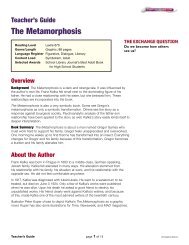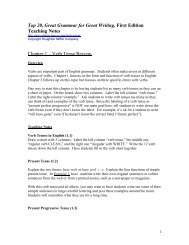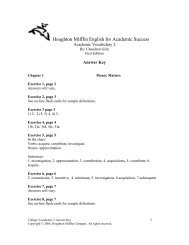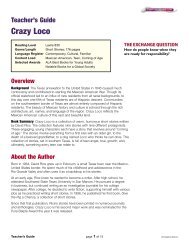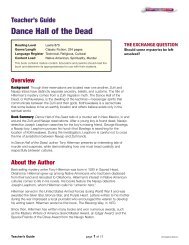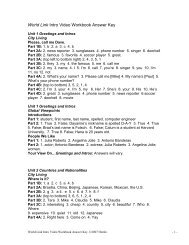Weaving It Together
Weaving It Together
Weaving It Together
Create successful ePaper yourself
Turn your PDF publications into a flip-book with our unique Google optimized e-Paper software.
or examples does he or she give to support<br />
the belief that the superstition is true?<br />
Culture Cue<br />
Remind students that although they may<br />
not believe in a particular superstition, it<br />
may have deep signifi cance to a person<br />
from another culture. <strong>It</strong> is important to be<br />
sensitive to the feelings of others who have<br />
belief systems different from our own.<br />
Internet Activity<br />
If students are interested, suggest that they<br />
research the numbers of a famous person’s<br />
birth date as well as the numbers of their<br />
own birth date.<br />
Suggested keywords:<br />
numerology<br />
lucky numbers<br />
number superstitions<br />
lucky dates<br />
Predicting, p. 14<br />
Answers will vary.<br />
Vocabulary<br />
A. Vocabulary in Context, p. 16<br />
1. a 2. a 3. b 4. b 5. d 6. a 7. d<br />
B. Vocabulary Building, p. 17<br />
1. a. superstitious b. superstitions<br />
2. a. lucky b. luck 3. a. believe<br />
b. belief<br />
C. Vocabulary in New Context, p. 18<br />
Answers will vary.<br />
20 Unit 1<br />
Reading Comprehension<br />
A. Looking for the Main Ideas, p. 18<br />
1. b 2. a 3. d<br />
B. Looking for Details, p. 19<br />
1. A seventh child had special gifts.<br />
2. A dream repeated three times will<br />
come true. 3. The seventh year in a<br />
person’s life brought great change.<br />
4. Three was lucky because it symbolized<br />
birth, life, and death. 5. Five is<br />
considered a holy and lucky number<br />
in Egypt. 6. Four symbolized unity,<br />
endurance, and balance. 7. One of the<br />
earliest written stories about the number<br />
13 appeared in Norwegian mythology.<br />
8. The thirteenth day of the month is<br />
considered unlucky for new enterprises<br />
or journeys. 9. They give a room the<br />
number 12A or 14 instead of 13.<br />
C. Making Inferences and Drawing<br />
Conclusions, p. 20<br />
Answers will vary. Possible answers:<br />
1. Pythagoras stated that things<br />
happen in sets of three. 2. A seventh<br />
child might be thought of as special<br />
because the number seven was thought<br />
to govern the lives of human beings.<br />
3. People might not want to stay in<br />
a room with the number 13 assigned<br />
to it. 4. Belief in the power of numbers<br />
has persisted in spite of the advances<br />
made by science and technology.<br />
5. People believe in superstitions<br />
because they are a way of making the<br />
world feel safer and more controllable.<br />
00238-X_006-073.indd 20 11/12/09 8:39 PM



